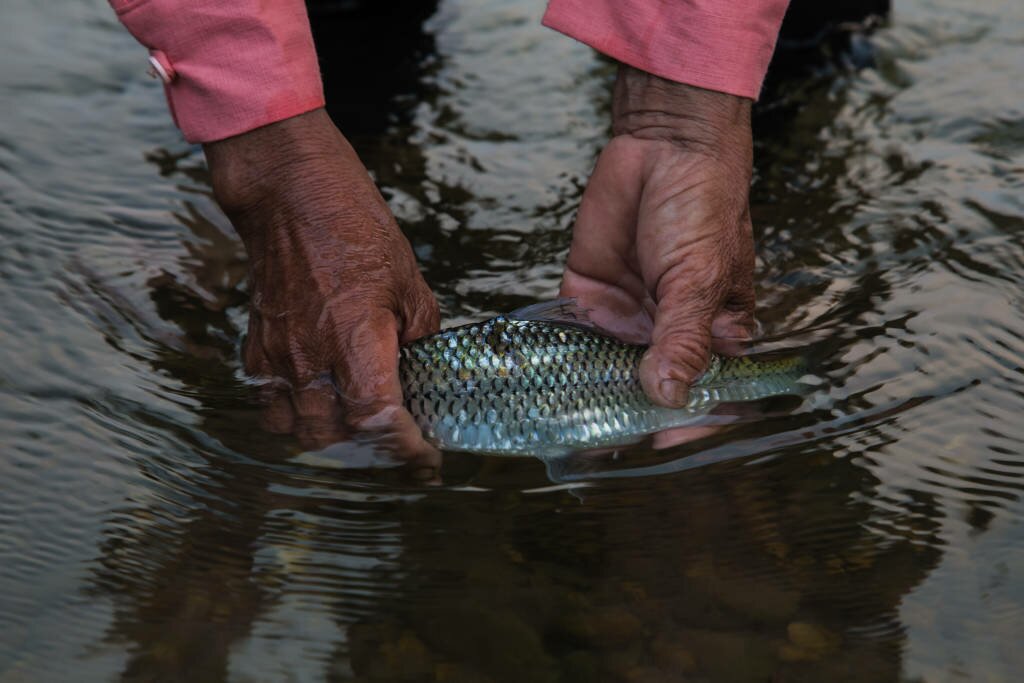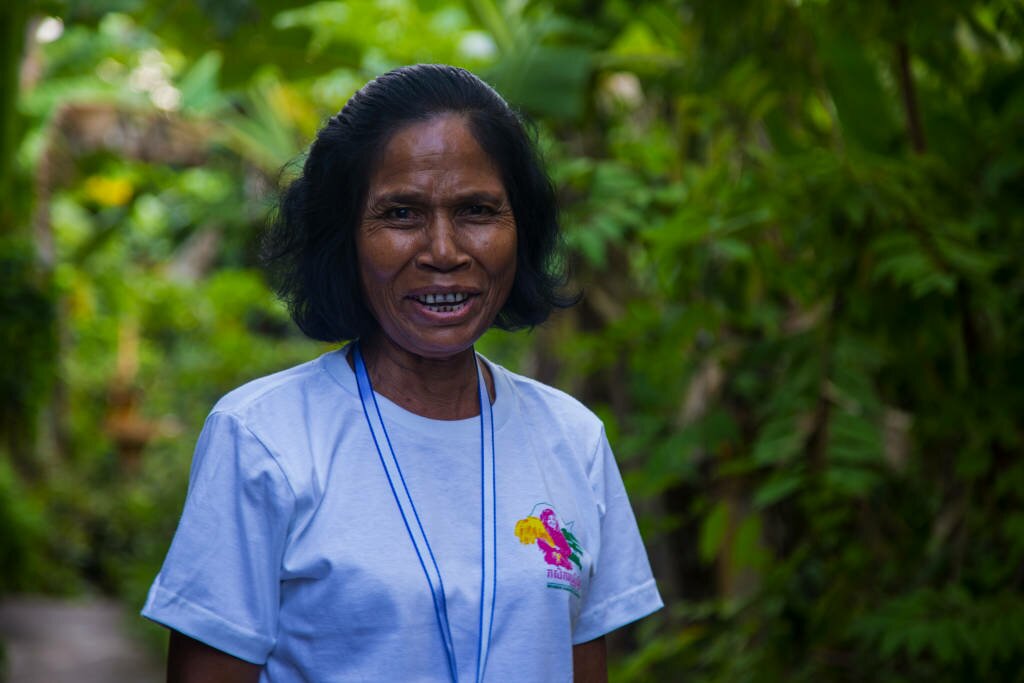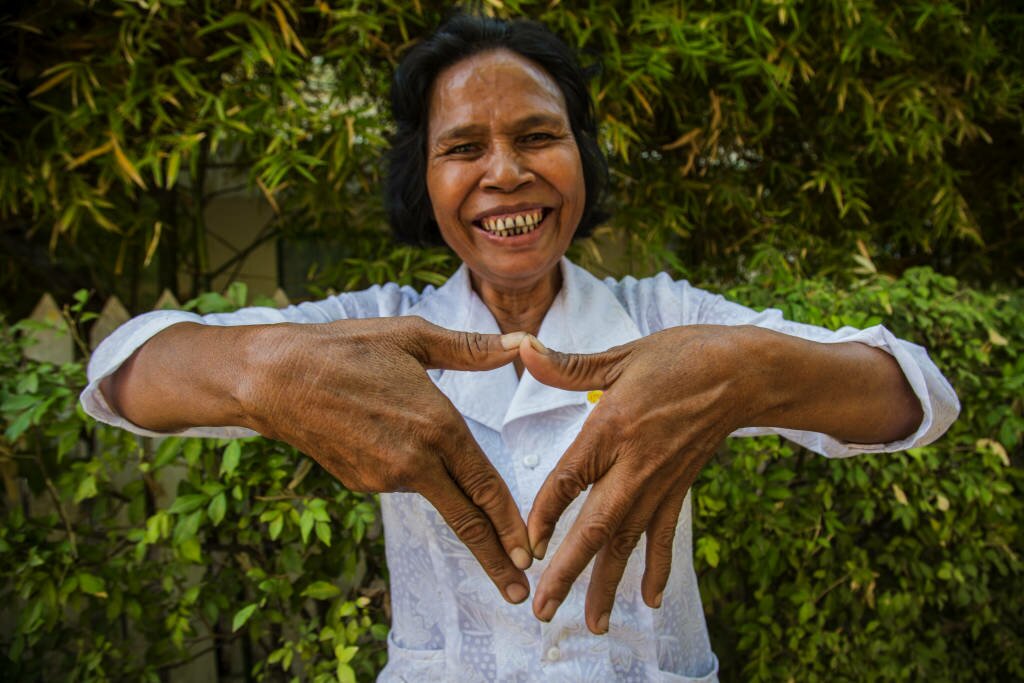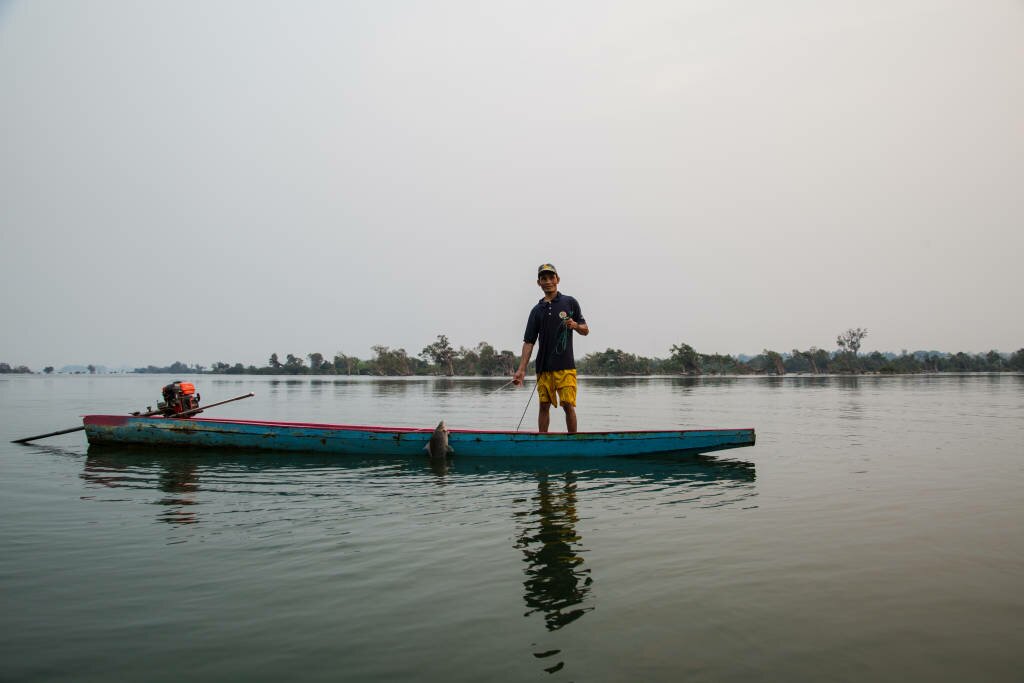
Less Mekong fish to catch in the river, according to the villagers living along the Mekong river in Preah Rumkel Community Ecotourism site in Orn Lung Chher Toeul village, Stung Treng. Photo by Oeurm Savann/Oxfam
Growing up in a low-income farming family along the Mekong river in Kratie, Chin Sokunthor, a 60 year old woman farmer, said what disappoints her the most is seeing people destroy her river, which is the heart of her family and of other Mekong citizens. She has never forgotten to speak, in every meeting or forum she has attended, about the love she has for the river. She is a river guardian.
Sokunthor sees the Mekong River as the lifeblood of millions of citizens. It provides water for drinking and for growing food like vegetable and rice. The fish from the river are also a great source of protein for the Mekong dwellers.
Growing up in a low-income farming family along the Mekong river in Kratie, Chin Sokunthor, a 60 year old woman farmer, said what disappoints her the most is seeing people destroy her river, which is the heart of her family and of other Mekong citizens. She has never forgotten to speak, in every meeting or forum she has attended, about the love she has for the river. She is a river guardian.
Sokunthor sees the Mekong River as the lifeblood of millions of citizens. It provides water for drinking and for growing food like vegetable and rice. The fish from the river are also a great source of protein for the Mekong dwellers.
The platform for women farmers[1]
Sokunthor was selected as one of the 100 woman farmer champions at the Sub-national Women Farmer Forum held last year to represent the Mekong region, which included delegates from the Cambodian provinces of Kampong Cham, Tboung Kmum, Kratie, Stueng Treng, Rattanakiri and Modukiri.
“I was selected to be a woman farmer champion because villagers trust in my ability to support them to improve their agriculture productivities and to deal with any related issues in the village, especially the issue of hydropower dam construction,” Sokunthor said.
On International Women’s Day of March 2016, Sokunthor, with support from Oxfam’s Inclusion Project, was in Phnom Penh to attend the National Women Farmer Forum. Her aim was to add her own perspective about the issues of “water” and “the Mekong River” to the forum discussion. There were about 200 other woman farmers at this Forum, organized by Oxfam and a dozen other national and international organizations, interested in helping woman farmers.
“As I am one of the selected woman farmer champions from the Mekong region, I have thought of different strategies to protect our river. Currently the Mekong faces danger with the water from the river getting lower and becoming more polluted, and this really affects the villagers’ health and their agriculture productivities,” Sokunthor said.
At the forum, Sokunthor and the other 99 woman farmers across the country received a farmer champion recognition letter from the Minister of Agriculture, Forestry and Fisheries (MAFF). With this recognition letter, they will play an important role to help improving the agriculture sector of Cambodia.

Sokunthor was at the sub-national forum in Kratie in December last year 2015 to share her experience about the Mekong River and the agriculture practices. Photo by Oeurm Savann/Oxfam
Sokunthor used this opportunity of the forum to encourage and engage woman farmer champions from different regions to advocate for the sustainability of the Mekong River. She emphasized that this woman farmers’ network will become a strong platform for debate about social issues and solutions.
“I have a very strong hope in the women farmer forum organized today because it is a platform to address and share issues and ideas. This forum also provides a space for woman farmers to build solidarity and learn about the problems of each other.”
In the past, Sokunthor said, women did not have power or rights to involve and participate in this kind of forum, but now it has changed completely. Women fully understand their rights and they can take part in any men’s works or activities. “Men can do, women also can,” said Sokunthor.
Building Knowledge and Confidence
Sokunthor has been involved in the Inclusion Project of Oxfam as an activist and woman leader to advocate for protecting the Mekong River since 2014. She actively takes part in the women on air radio program of Oxfam’s partner, Northearn Rural Development (NRD) to educate and raise awareness of the issues related to the Mekong and environmental and natural resources management. The main issues she often talks about on radio are illegal fishing and hydropower.
Oxfam works with the local partner such as NRD to train women along the Mekong River like Sokunthor on issues such as natural resources management, law and policy about the natural resources management. They also provide support for the women to participate in workshops and forums to give a voice to the issues they know personally, such as illegal fishing or the Don Sahong dam.

Sokunthor shows a sign of the love for the river. Photo by Oeurm Savann/Oxfam
“My life has been changing a lot since I took part in the Inclusion Project. I am more confident and brave. I am not afraid to speak out about the right things. I want to be a role model for the next generation. I want to help propose and encourage young people, especially the Mekong youth, and women to follow my footsteps for the sake of our environment, natural resources and the river,” Sokunthor said.
Commitments for the Mekong
Since the beginning of 2016, Sokunthor has observed that the Mekong water levels were much lower; this has badly affected the livelihoods of the poor farmers and fishermen.
“Both fish and dolphins in the Mekong are also at risk to vanish. The biggest issue causing this problem, I think, comes from the hydropower dams that were built along upstream of the Mekong River,” Sokunthor said.
Sokunthor has shown her commitment to take actions to stop hydropower dam constructions. She mentioned that the intensive environmental impact assessment study should be properly conducted and that the findings of the study should be shared with villagers living along the river, so that all may understand the future consequences of the hydropower dams.
“Regarding protecting the river, I will continue mobilizing people to stop any illegal fishing. I continue to patrol and to prevent any type of that matter occurring in the Mekong River,” said Sokunthor, “Moreover, I will urge or request the government to stop the dam construction. I will also mobilize villagers to submit their petitions to the government if new dams are planned, because I don’t want any bad things happening to our river, especially those which would badly harm the environment and species underneath the river like dolphins and fish.”

The fishermen caught the fish in the Mekong River in Stung Treng Province. Photo by Oeurm Savann/Oxfam
[1] Oxfam’s work on Women Farmer Champion aims to empower women and smallholder farmers to be able to communicate their interests and ideas for a resilient and sustainable agriculture sector. It seeks to introduce opportunity for women farmers to share interests and ideas and to participate in different level of decision making.
